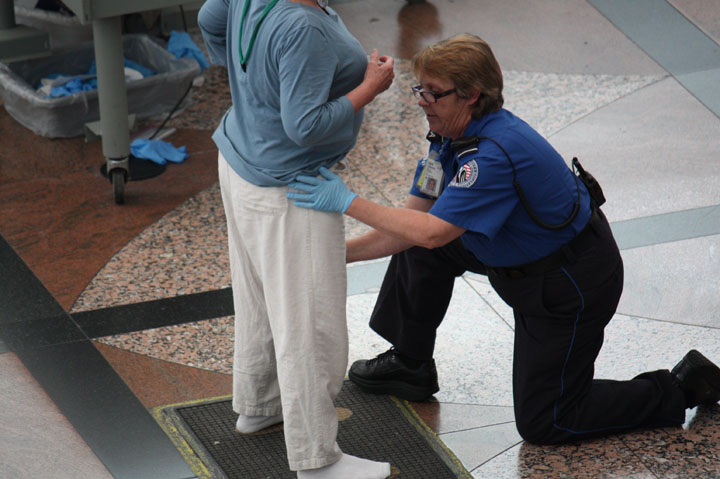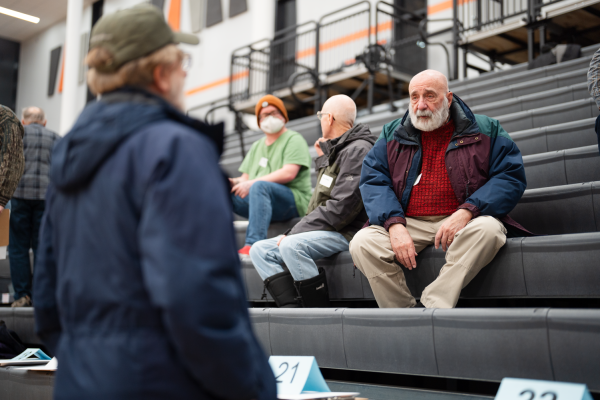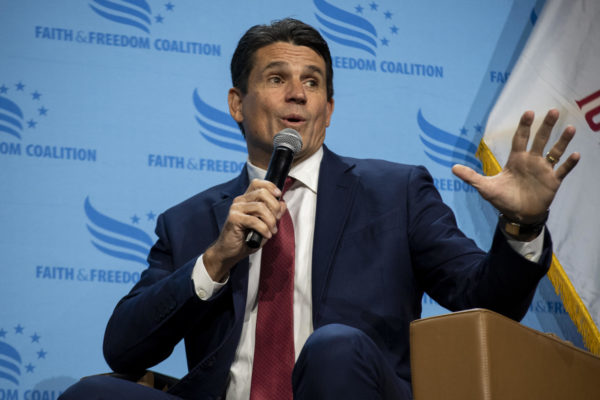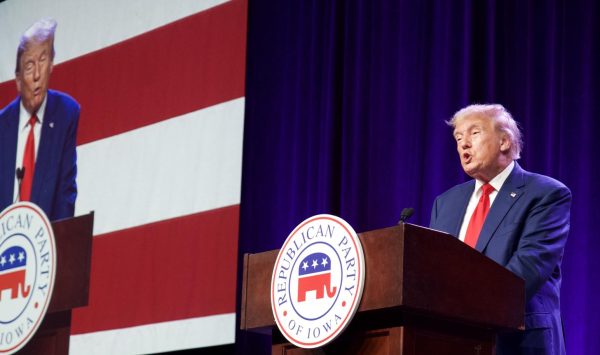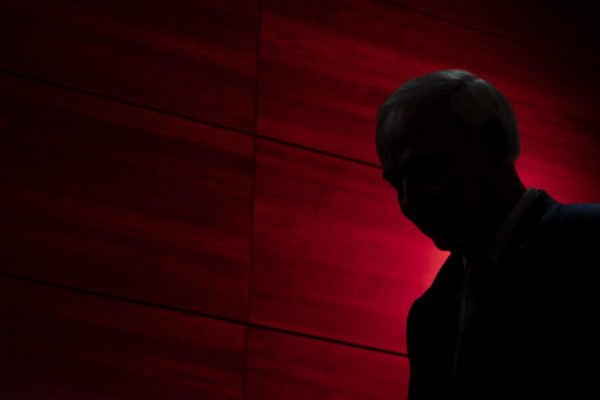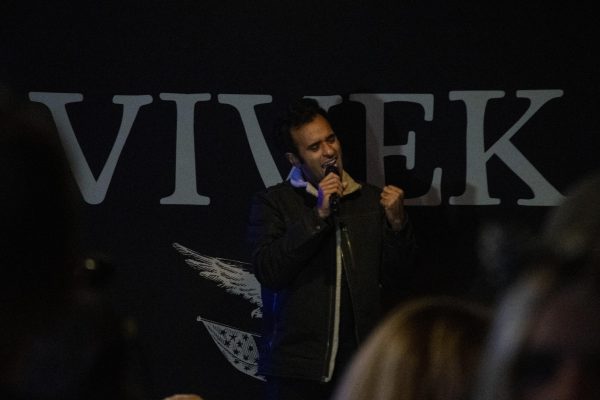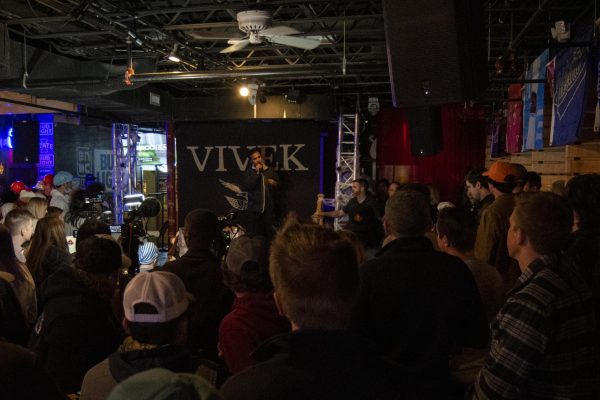‘Opt-Out Day’ fails to slow airport security
November 24, 2010
The controversy over new security measures at airport checkpoints — which some feared would reach a boiling point Wednesday, one of the year’s busiest travel days — instead didn’t even appear to have attained a simmer as of midmorning.
Critics had declared the day before Thanksgiving “National Opt-Out Day” and urged travelers who are selected to undergo full body scans to refuse to subject themselves to the advanced imaging technology.
Anyone who refuses a scan is checked instead by the more time-consuming “enhanced” pat-down procedure. Security lines at busy airports nationwide could be snarled if a large number of people opted for the pat downs, and the Transportation Security Administration said it was as prepared as possible to deal with any resulting delays.
As of midmorning Wednesday, however, no major problems or delays were reported at airports because of the protest. Many air travelers took to Twitter to say they experienced no security problems.
“It’s a nonevent,” said Christopher White, a spokesman for AirTran Airways. “… When it comes down to it, people want to get to their destinations as quickly and easily as possible.”
“We haven’t seen any impact on operations today,” said Al Snedeker, a spokesman for Hartsfield-Jackson Atlanta International Airport in Georgia. “… Things are running smoothly.”
A blog maintained by the TSA showed there have been a few opt-outs at airports, but not many. Security checkpoint waits were less than 30 minutes. “Had 39 minutes at 5 a.m., but now we’re under 20,” said a report from Denver.
“Many, many compliments and few opt-outs,” said a report from Boston.
In Burlington, Vt., one passenger who received a pat down said, “That’s it? That’s all there is to it? Why is the media making such a big deal? I’ve received more invasive pat downs just going to a rock concert,” according to the blog.
“Every traveler is a critical partner in TSA’s efforts to keep our skies safe,” TSA Administrator John Pistole said in a statement Wednesday, “and I know and appreciate that the vast majority of Americans recognize and respect the important work we do.”
Earlier Wednesday, the co-founder of the website wewontfly.com, James Babb, said, “What we’re talking about right now is not about security. We’re talking about security theater. The experts pretty much agree that what they’re doing here is completely ineffective. … I want us to have the best security possible. That means we have to abandon the security theater, and we have to bring in common sense. What they’re doing right now is for show.”
But Pistole said the advanced scanners, and even the pat downs that are seen as overly intrusive by critics, give security officials the best possible chance to detect a nonmetallic device like the one used by a man charged with attempting to detonate a bomb sewn into his underwear on a Christmas Day flight in 2009.
Pistole urged travelers to work with, not against, the security agency. “The bottom line is, we’re all trying to get people home safe for the holidays,” he said. “The best way we can do that is in partnership with the traveling public.”
Everyone on a plane, he said, wants to know that everyone else has been cleared. “You’re not a terrorist, I’m not a terrorist, but what about everybody else?” he asked.
The TSA’s full body scans and the enhanced pat-down procedures have been the target of growing criticism. Some passengers have shared horror stories of pat downs that seemed too invasive or intimate.
A Michigan man said that he endured what he called an “extremely embarrassing” pat down this month. Thomas Sawyer, a bladder cancer survivor who has worn a urostomy bag since a surgery three years ago, said a TSA agent at Detroit Metropolitan Airport caused the seal of the bag to open partially during a pat down, spilling urine on his clothes.
Pistole said he spoke to Sawyer this week and had a “very good conversation.” He said that he is taking Sawyer up on his offer to speak to TSA agents and educate them about external medical devices.
Pistole said he is sensitive to concerns raised by critics who say the scans and pat downs violate individual privacy, but he repeated, as he has the past few days, that his agency is attempting to strike a balance between those concerns and travelers’ security.
Delta Air Lines said it might offer refunds if travelers are concerned about security measures, but spokesman Kent Landers said the circumstances would need to be “highly extenuating.” If there is a “very unusual or extenuating circumstance, we’ll work with them on a case-by-case basis,” he said. But in general, customers should expect normal ticketing rules to apply.
Organizers of the opt-out day said on their website, “The goal of National Opt-Out Day is to send a message to our lawmakers that we demand change. We have a right to privacy and buying a plane ticket should not mean that we’re guilty until proven innocent.”
Pistole acknowledged Tuesday, “If people decide intentionally to slow down the process, that will have an adverse effect on people getting on their flight on a timely basis.”
Asked about the possibility of slowing security lines and delaying people’s reunions with family members, Babb, the wewontfly.com co-founder, said, “That’s not our goal. That’s why for weeks we’ve been telling people to avoid air travel altogether.”
Although the Food and Drug Administration has said the radiation used in the scans is safe, Babb said concerns remain. “There are experts that say it’s not acceptable,” he said. “That’s a choice that the individual should make, and it should not be imposed upon us.”
Pistole said he believes the measures are necessary and cited a Gallup poll released Wednesday in which 71 percent of respondents said thorough security procedures are needed.
While the pat downs may be seen as intrusive, Pistole noted that tests of airport checkpoints have shown that people who should have been stopped have consistently been able to slip through, and a primary reason was the lack of a thorough pat down by agents.
The TSA is working with various agencies to determine whether a modification of procedures to assuage critics would compromise security, Pistole said.
The body scanners are not in every U.S. airport, although more will be put in by the end of the year, he said. Asked if the lack of them made certain airports less safe, Pistole said, “That is one of the challenges we’re dealing with.” He said there are no guarantees, but all security officials can do is make its best effort.
— CNN’s Wayne Drash and Ashley Hayes contributed to this report.

